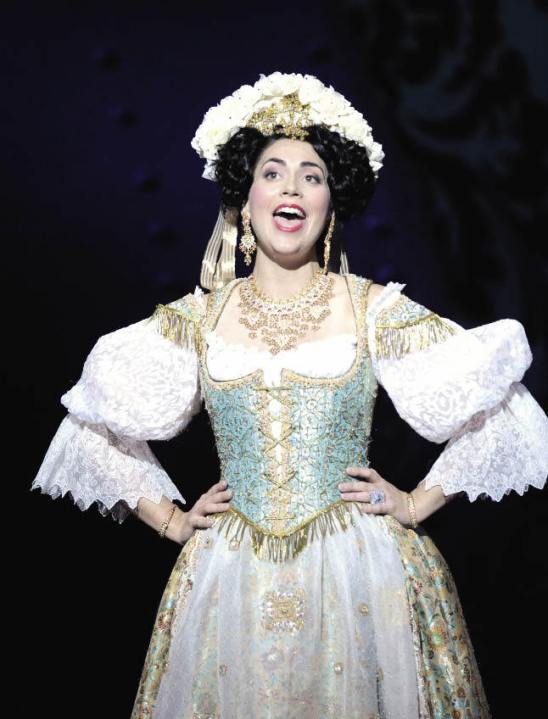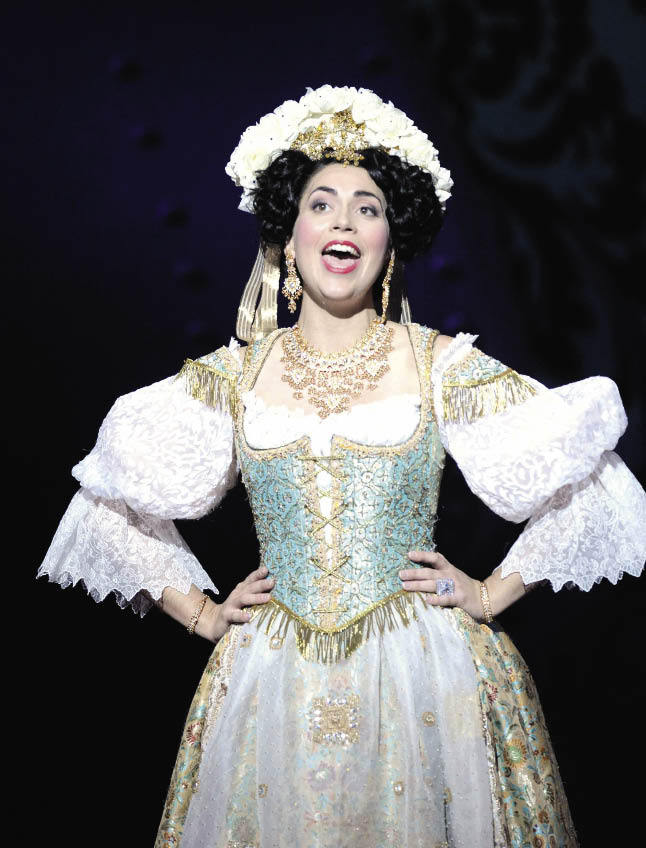It’s been too long since I saw The Merry Widow. I have been thinking that for some time, and the superb new production of it by Opera North only made me feel that we should be able to go to more performances of it than we get a chance to. It has been newly and wittily translated by Kit Hesketh-Harvey, and the production is in the safe hands of Giles Havergal, with set and costume designs by Leslie Travers.
It’s been too long since I saw The Merry Widow. I have been thinking that for some time, and the superb new production of it by Opera North only made me feel that we should be able to go to more performances of it than we get a chance to. It has been newly and wittily translated by Kit Hesketh-Harvey, and the production is in the safe hands of Giles Havergal, with set and costume designs by Leslie Travers.
In this economic climate nowhere but the Royal Opera would be able to mount a lavish production, but Travers, clearly working closely with Havergal, cleverly manages to suggest glamour, which is indispensable in this piece. At the same time, the rather pinched nature of the glamour — very obviously two-dimensional chandeliers, for instance — gives an accurate indication of the state of Pontevedro’s finances. There is a slightly moth-eaten quality about the Pontevedrians’ clothes, too, except for Hanna — when she enters she brings with her a sense of wealth and style, if not exactly of class. I don’t know if it is a planned effect, but Stefanie Corley’s Hanna looks marvellous, but when she speaks she sounds a bit common, and when she sings it is with a soubrettish, mildly acid tone. She knows how to flirt, though, and the successive scenes between her and Danilo, spoken and sung, cover a lot of emotional territory, in the way that scenes between old flames who are considering whether to rekindle should. William Dazeley makes a satisfying Danilo, so long as you are content with a baritone in the part. He is reasonably louche, unconvincingly cynical, and has a mellow, pleasant singing voice: I could do with rather more bitterness, especially in Danilo’s narrative of the royal children, but it’s a part to grow into.
Something that strikes me always about the Widow is the offhand way in which commentators use such terms as ‘escapist’, ‘never-never land’, and so on. I wonder in what way Widow is escapist that its exact contemporary Salome is not? Just because Salome gives its audience the chance to witness and surely to revel in degradation, religious mania, murderous lust and necrophilia, all taking place in a realm that is remote from historical fact but fairly close to biblical fiction, while Widow enables us to observe people harmlessly enjoying themselves and eventually, if not permanently, being happy in love, does that mean that one is more escapist than the other? That sounds to me like a vulgar version of the view, itself disreputable, that tragedy is more serious than comedy.
The second, subordinate pair in Widow, Valencienne and Camille, has more potentiality for pathos than the lead pair, and their duet in Act II strikes the most intense notes in the whole score. Amy Freston and Allan Clayton, ardently accompanied by Wyn Davies, almost upstaged their superiors here; but Lehár let them disappear after that, perhaps anxious that he had unbalanced his score. Valencienne’s put-upon husband Zeta was given moving dignity by Geoffrey Dolton after an uncertain, too-Gilbertian start. The girls from Maxim’s, both singers and dancers – and, in the case of Freston, brilliantly both – were pure joy, and the evening came to an abandoned, audience-participating end.
The Barber of Seville (or Salisbury), staged by OperaUpClose at the King’s Head in Islington, has been extensively advertised, and some leading theatrical plutocrats, such as Jonathan Miller and Joanna Lumley, have endorsed it. It is the latest salvo in the anti-élitist campaign that is periodically waged against the big opera companies and the very high prices of tickets at, especially, the Royal Opera. But that large numbers of people want to see the kind of productions that those companies mount is proved by the immense popularity of the screenings at large cinemas of Met performances, and of open-air screenings of Royal Opera performances. To think that the alternative — or proper replacement — for those is to put on a show with a piano and some young singers at the back of a pub is crass. La Bohème worked at the Cock in Kilburn partly because of the unique qualities of that work, which include its ability to survive a lot of approximate singing. Rossini is an utterly different matter: precision and virtuosity are of the essence, and smudged coloratura is painful.
The version that you can see at the King’s Head certainly has its strong points: in the performance that I saw (there are two alternating casts) the Rosina of Rowan Hellier was like a bored, randy cat, a wonderfully conceived and partially executed interpretation. Her guardian, called by the translator Dr Bartleby, was in some ways, especially in vocal technique, still better realised by John Savournin. And the Mr Basil of Georgias Papaefstratiou was an effectively creepy affair. The fact remains that no one can enjoy a Rossini overture being played on a piano, nor, I’d have thought, take pleasure in an evening of relentless bawling. No doubt the acoustic of the King’s Head is over-reverberant, but the singers were making no attempt to curb their resources. A noisy romp can be fun, but shouldn’t be mistaken for a decent presentation of a great opera.







Comments